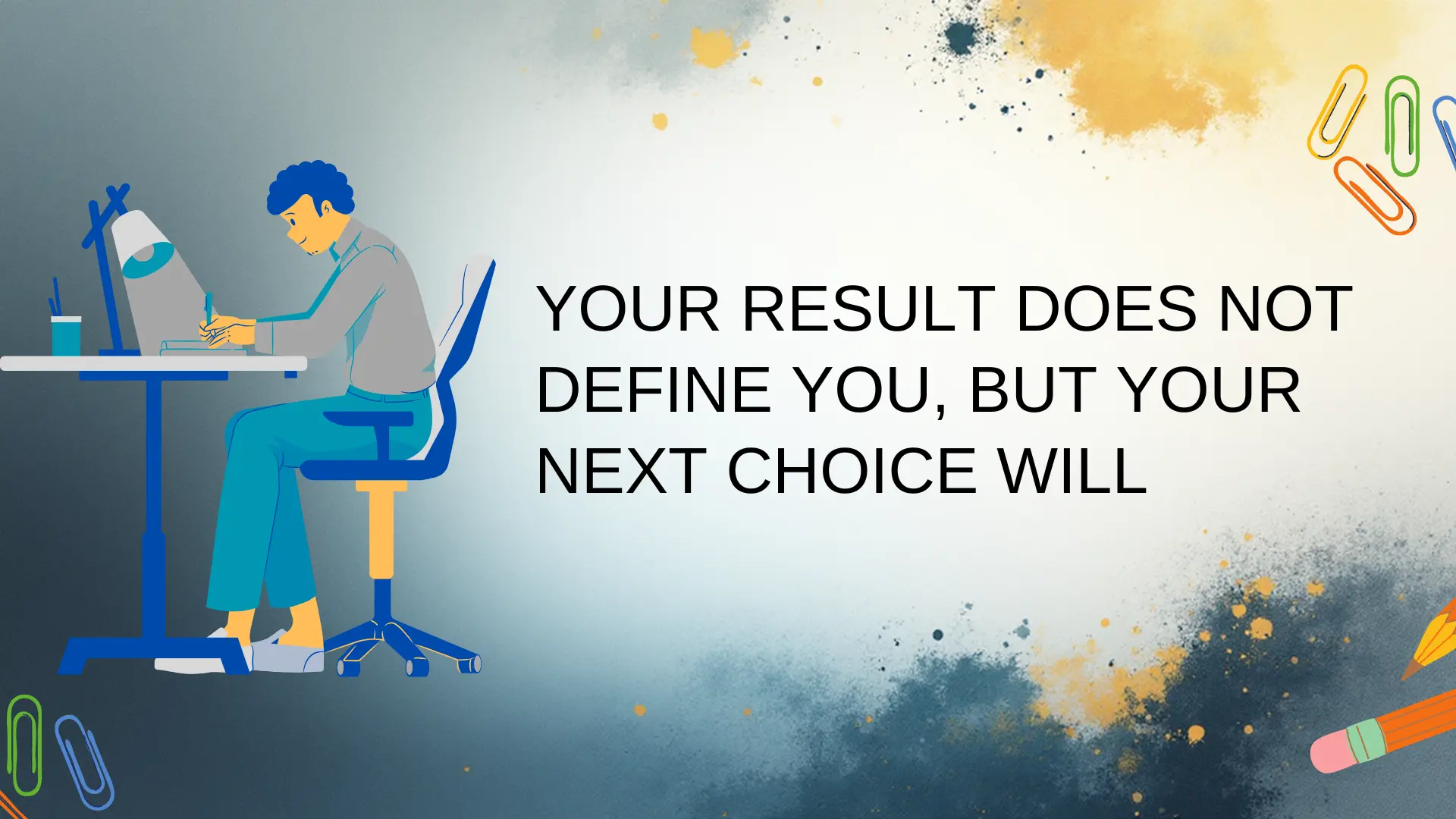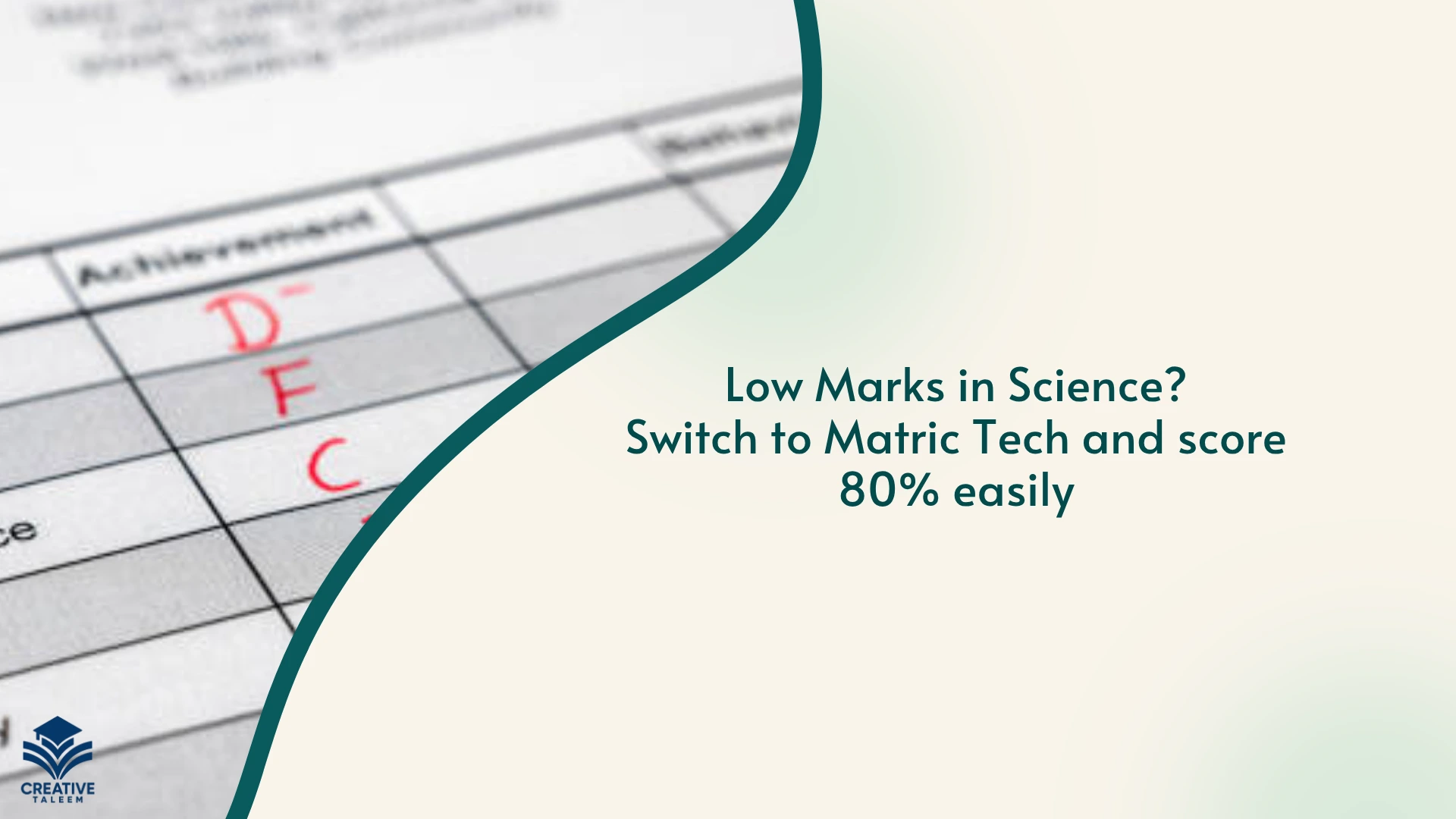Your Result Does Not Define You, But Your Next Choice Will
Discover why your exam results don't determine your future, but the choices you make after those results truly matter. A real story of transformation.

Since childhood, we've all heard the same comforting phrase repeated over and over: "A single piece of paper cannot decide your future." Every motivational speaker, every social media post, every well-meaning relative tells us this when we fail an exam. And yes, this statement is true. But here's what nobody tells you: it's only half the truth.
The Incomplete Motivation We All Hear
I've spent years scrolling through social media, reading articles, watching motivational videos, and listening to inspirational reels. I've seen thousands of comments on posts about exam failures. Everyone rushes to comfort struggling students with that same familiar line about results not defining your future.
But here's what I noticed: nobody ever completes that sentence. Nobody tells you what comes after. They stop at the comforting part, leaving students with false hope but no real direction. I don't know why this happens. Maybe because completing the thought is harder. Maybe because the full truth requires more than just motivation, it requires honest self-reflection.
Until I discovered the complete truth myself: Your result does not define you, but your next choice will. That second part changes everything. It shifts the focus from feeling sorry for yourself to taking responsibility for what happens next.
My Personal Journey: When I Ignored What My Results Were Telling Me
Let me share my own story, because I lived this confusion for years before understanding it.
The Mathematics Topper Who Chose Biology
I was always exceptional at mathematics. In 5th class, I scored an A+ grade in PEC exams. When 8th class came around, I again secured an A+ in mathematics. During matric, where students take both Biology and Mathematics, guess what happened? My Biology marks were mediocre at best, but Mathematics? Another A+ grade.
The pattern was crystal clear. My results were screaming at me: "You're built for mathematics, not biology." But did I listen? No. Because like every other middle-class Pakistani family, my parents had decided from childhood that I would become a doctor. And I, wanting to make them happy, ignored what my own performance was telling me.
The FSc Pre-Medical Disaster
After matric, when I should have chosen ICS or FSc Pre-Engineering (fields that matched my mathematical ability), I instead enrolled in FSc Pre-Medical. Everyone around me was supportive. My parents were proud. I was following the "respectable" path to becoming a doctor.
Then reality hit hard. In Part I, I failed Biology. Completely failed. And do you know what I kept telling myself during that failure? "A single piece of paper cannot decide my future." I repeated this like a mantra, as if saying it enough times would make it true without me having to change anything.
I struggled through Part I, eventually passing. I suffered through Part II, somehow managing to clear it as well. But my grade dropped to B, not the A I had been consistently getting in mathematics. When I tried applying to universities for Botany or Zoology (still clinging to the medical field), I didn't get selected. My mediocre result in a field I wasn't meant for had closed doors.
The Moment Everything Changed
Sitting there, rejected from universities, I felt devastated. But more than that, I felt a deep sense of regret. Not regret about failing, but regret about ignoring all the signs that had been there all along.
My heart had been telling me the truth for years. It kept whispering: "Study with mathematics. Go into IT. Follow where your natural abilities lead you." But I had drowned out that voice with what I thought others expected from me.
That's when I made my next choice. Instead of continuing to force myself into biology-related fields, I decided to pursue IT and mathematics. I took the university entrance exam for mathematics and scored an A+ grade again. That moment was like coming home after being lost for years.
That day, I finally understood what my results had been trying to tell me all along: I was never built for biology. My results weren't defining me as a failure. They were guiding me toward where I actually belonged. But I had spent years misinterpreting them as obstacles instead of signposts.
What Your Results Really Tell You
Here's the truth that nobody wants to say plainly: your results are feedback, not judgment. They're not telling you whether you're smart or stupid, worthy or worthless. They're telling you where your natural abilities lie and where they don't.
Results Are Direction, Not Destination
When you consistently score high in certain subjects and struggle in others, that's not random. That's your brain and personality showing you where you naturally excel. A student who gets A+ in Mathematics but fails Biology isn't a bad student. They're a mathematics student being forced to study biology.
Think about it logically. If you're naturally talented at something, studying it feels less like work and more like exploration. Concepts click faster. Problems seem solvable. Success comes more naturally. When you're studying something that doesn't match your abilities, even basic concepts feel like climbing mountains.
The Pressure of Parental Expectations
I understand why my parents wanted me to become a doctor. This is common in every middle-class family. Parents want their children to have comfortable lives without the struggles they faced. They mean well. Their intentions come from love and concern for our future.
But here's where it goes wrong: they ask us to listen to their dreams while ignoring our own abilities and interests. They want us to achieve what they think is best, not what we're actually capable of excelling at. This creates a painful situation where you're living someone else's dream and failing at it instead of living your own dream and succeeding.
Eventually, many students reach a breaking point. They look back and think: "Why did I listen to them? Why didn't I do what I wanted? Why did I do what everyone expected instead of what I was actually good at?" And by then, years have been wasted, confidence has been damaged, and you're starting from behind in a field you should have chosen earlier.
Your Next Choice: This Is What Really Matters
So your result doesn't define you, that part is true. A bad grade in Biology doesn't mean you're a failure as a human being. But what you choose to do after getting that result absolutely will define your next steps and potentially your entire future.
The Wrong Choice: Ignoring the Message
When you get low marks in science subjects, you have options. The wrong choice is to ignore what those marks are telling you and stubbornly continue on the same path. This is what I did, and it cost me years of struggle and stress.
The wrong choice is comforting yourself with "results don't matter" while making no changes to your educational path. The wrong choice is studying harder in subjects you clearly have no aptitude for, hoping that somehow, more effort will overcome a fundamental mismatch between your abilities and your chosen field.
The Right Choice: Following Where You Actually Belong
The right choice is honest self-assessment. Look at your results not as failures but as data points. Where do you consistently excel? Where do you consistently struggle? What subjects make sense to you naturally versus which ones always feel forced?
The right choice is having a difficult but necessary conversation with your parents. Explain that you respect their dreams for you, but those dreams need to align with your actual abilities. Show them your pattern of results. Help them understand that forcing you to continue in a field where you're clearly struggling isn't helping anyone.
The right choice might be something like switching to Matric Tech if traditional science isn't working for you. The right choice might be choosing ICS when your heart and results both point to computer science, even if your family wanted you in medicine. The right choice is following where your natural abilities actually lead.
Stop Looking at What You Can't Do, Start Seeing What You're Made For
This is the most important lesson from my entire journey: your results aren't showing you what you can't do. They're showing you what you were made for.
When I kept failing Biology but excelling at Mathematics, my results weren't saying "you're bad at academics." They were saying "you're a mathematics person being forced to study biology." The moment I aligned my education with my actual abilities, everything changed. Suddenly, studying didn't feel like torture. Success felt achievable. I was finally swimming with the current instead of against it.
Too many students waste years focusing on their weaknesses, trying to force improvement in areas where they have no natural ability. Instead, they should be developing their strengths, the areas where they naturally excel. A student who's amazing at practical technical subjects shouldn't spend years struggling with theoretical science. A student who's brilliant at arts and design shouldn't force themselves through engineering mathematics.
How to Make Your Next Choice Wisely
If you're currently facing this situation, where your results are showing you something different from the path you're on, here's how to make your next choice count.
Analyze Your Pattern Honestly
Look at your results across multiple years. Where are you consistently strong? Where are you consistently weak? One bad result might be a fluke, but patterns tell the truth. If you've been struggling with science for three years straight while excelling at languages or arts, that's not bad luck. That's information about where your abilities actually lie.
Separate Your Dreams from Others' Dreams
Write down what you actually enjoy studying versus what you think you should study. Often, students discover they've been pursuing careers they don't even want, just because society or family expects it. Be honest about whether you're following your own path or living someone else's unfulfilled ambitions.
Explore Alternative Paths
Pakistan's education system is changing. Programs like Matric Tech now offer practical alternatives to traditional academic paths. You don't have to force yourself through FSc Pre-Medical if Matric Tech's Health Sciences Group better matches your learning style. You don't have to suffer through pure sciences if technical education aligns better with your abilities.
Get Guidance from the Right Sources
Visit Creative Taleem for comprehensive guidance on educational choices that actually match your abilities. The platform provides honest information about different educational paths, helping students make informed decisions based on their actual strengths rather than societal pressure.
Final Thoughts: Complete the Sentence Yourself
Yes, your result does not define you. A bad exam score doesn't determine your worth as a person or your potential for success in life. But that's only half the truth.
The complete truth is: Your result does not define you, but your next choice will. What you choose to do after getting those results, how you respond to the information they provide, what path you decide to follow based on honest self-assessment, these choices will absolutely shape your future.
Stop using that incomplete motivational phrase as an excuse to avoid making necessary changes. Start seeing your results as guidance toward where you actually belong. Follow your natural abilities instead of fighting against them. Make the next choice that honors both your strengths and your authentic interests.
Because at the end of the day, you're not defined by a piece of paper. You're defined by whether you had the courage to listen to what that paper was trying to tell you and act accordingly. That's what separates students who eventually succeed from those who spend years struggling in the wrong field.
Your next choice matters. Make it count. Make it honest. Make it yours.
Frequently Asked Questions
Why do people say exam results don't define your future?
This statement is partially true because a single exam score doesn't determine your worth as a person or your ultimate potential. However, the complete truth is that while results don't define you, the choices you make after receiving those results absolutely shape your future. Results should be seen as feedback and guidance, not judgment.
How should I interpret my exam results honestly?
Look at your results as data points across multiple years. Identify patterns - where do you consistently excel and where do you struggle? One bad result might be a fluke, but repeated patterns reveal your natural abilities. If you excel in Mathematics but struggle in Biology consistently, that's guidance toward where your aptitudes truly lie, not a measure of your intelligence.
What should I do if my results don't match my chosen career path?
First, assess whether you're pursuing your own dreams or someone else's expectations. Then explore alternative paths that align with your actual abilities. Pakistan's education system now offers options like Matric Tech for students who learn better through practical approaches. Consider having an honest conversation with your parents about aligning their expectations with your natural strengths.
How can I convince my parents to let me change my educational path?
Show them your pattern of results over time and explain how your strengths lie elsewhere. Help them understand that success comes from developing your natural abilities rather than forcing yourself into a mismatched field. Share information about alternative pathways like Matric Tech or other programs that match your actual interests and capabilities.


